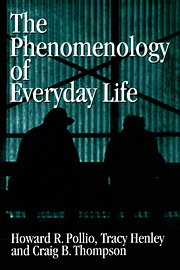Book contents
- Frontmatter
- Contents
- Preface
- PART I EXISTENTIAL PHENOMENOLOGY AND THE SCIENCE OF PSYCHOLOGY
- PART II GROUNDING THE WORLD OF EVERYDAY LIFE
- PART III SELECTED TOPICS FROM EVERYDAY LIFE
- 6 Feeling Alone
- 7 Making Amends: The Psychology of Reparation
- 8 Love and Loving
- 9 Falling Apart
- 10 The Meanings of Death in the Context of Life
- PART IV THE PHENOMENOLOGY OF EVERYDAY LIFE
- References
- Name Index
- Subject Index
7 - Making Amends: The Psychology of Reparation
Published online by Cambridge University Press: 04 August 2010
- Frontmatter
- Contents
- Preface
- PART I EXISTENTIAL PHENOMENOLOGY AND THE SCIENCE OF PSYCHOLOGY
- PART II GROUNDING THE WORLD OF EVERYDAY LIFE
- PART III SELECTED TOPICS FROM EVERYDAY LIFE
- 6 Feeling Alone
- 7 Making Amends: The Psychology of Reparation
- 8 Love and Loving
- 9 Falling Apart
- 10 The Meanings of Death in the Context of Life
- PART IV THE PHENOMENOLOGY OF EVERYDAY LIFE
- References
- Name Index
- Subject Index
Summary
At first glance, reparation might seem an unusual topic for psychology to consider since the verb to repair occurs most often not in the world of interpersonal relations but in the realm of things that break or no longer work. But people also break; they have broken hearts and broken lives, and they, too, seek ways to put the pieces of their lives and hearts back together again. To be human is to have difficulties in interpersonal relationships and, sometimes, to have relationships that break apart. We all know what it is to go about the work of “making up”; if the stakes are high enough or the rupture severe enough, we may even seek professional help to assist us in repairing a broken relationship or marriage.
Despite an initial impression to the contrary, we do talk about fixing interpersonal relationships in somewhat the same way as we talk about fixing broken vases and automobiles. Images of wholeness and perfection are among the most elementary prototypes of human consciousness, and a family of metaphors has grown up to describe experiences of this type. Consider, for example, how we speak of some event or object as complete or incomplete: A chef may taste a sauce and determine that “it needs something”; an individual grieving the death of a loved one may describe his or her experience as “feeling incomplete.” In both cases, the present state of lack or incompleteness is experienced against a ground of wholeness or perfection.
A different metaphor for perfection refers to a concern with balance.
- Type
- Chapter
- Information
- The Phenomenology of Everyday LifeEmpirical Investigations of Human Experience, pp. 191 - 226Publisher: Cambridge University PressPrint publication year: 1997



